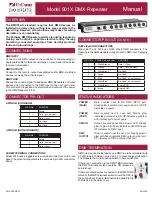
5. COMMISSIONING
Checks on the electrical installation should include earth continuity and insulation tests
1.
and must be undertaken by a competent person.
Ensure that all the electrical connections at the lamps and the terminal rails have been
2.
made correctly, that they are tight and that there is no loose or frayed wire.
Replace and secure the terminal cover and replace and secure the front panel.
3.
Check that the mounting bracket is securely fixed in the vertical position such that the
4.
lamps remain in a horizontal plane at all angles of heater displacement.
Roughly align the heater(s) and tighten the adjusters.
5.
Switch on the heater(s) and check that the lamp(s) are all operating. If time or
6.
temperature controls are fitted check these for correct and safe operation by reference
to the supplier’s instructions.
Make any adjustments that are necessary to give an even spread of heat over the
7.
required area. This may be done simply by perception of the heating effect or by using
the distribution of visible light either at night or by darkening the room.
Hand over
Hand over these instructions and make sure the user is familiar with all aspects of
operation and safety including the need for regular cleaning and an annual inspection.
In the event of the premises being unoccupied then leave heater(s) switched off and
isolated from the electrical supply. Leave instructions adjacent to the electricity meter.
6. MAINTENANCE
Since the Dimplex Quartz Heater contains no moving parts little maintenance is required
beyond cleaning and lamp replacement. It is however, essential that the heater is not
operated with accumulation of dust or dirt on the lamp(s) or reflector(s) as this can cause
a build up of heat and eventual damage. For this reason the heater must be inspected
regularly depending upon conditions and at least at yearly intervals.
Before undertaking any maintenance work on the heater due attention must be paid to the
following:
Always disconnect the heater from the electricity supply before attempting to work on
1.
or near it.
Always ensure a safe means of access using an access tower or properly supported
2.
ladder.
Some types of quartz lamps run with an internal pressure in excess of atmospheric
3.
pressure and while construction is very strong there is a slight risk of shattering. If it is
necessary to examine a bare lamp whilst in operation then a protective screen must
be used.
Allow adequate time for the lamps and body casing to cool before attempting to work
4.
on the heater.
7. LAMP REPLACEMENT
WARNING. BEFORE UNDERTAKING THIS TASK ENSURE THE HEATER IS
DISCONNECTED FROM THE ELECTRICITY SUPPLY.
Detach heater from its mounting position.
1.
Unscrew the front panel by loosening the corner fixing screws, and then lift front panel
2.
clear.
Disconnect the wires to the old lamp by removing the lock nuts retaining the terminal
3.
ends adjacent to the lamp clips. Do not slacken the screws as this could disturb the
internal wiring.
Remove the lamp by gently releasing the ends from the spring clips. Keep the lamp
4.
secure and do not twist the ends or apply undue force. IMPORTANT - Release and
retain the high temperature cable ties from the element wires. (These must not be
substituted).
Before removing the new lamp(s) from its protective packing it is important to be
5.
aware that quartz lamps are fragile and must be handled with care at all times. Avoid
touching the surface of the quartz sleeve with bare fingers. If the sleeve is accidentally
touched remove the finger print with a soft cloth moistened with methylated spirit.
Hold the lamp firmly but gently at each end and offer up to the spring mounting clips.
6.
The wire leads should face towards the front of the heater. Push the lamp fully into the
clips taking care to keep it square. Do not twist the ends or apply undue force. If either
end of the lamp will not easily engage in the spring clips remove the lamp and gently
ease the spring.
The wire from each end of the lamp must be connected to the threaded connector ON
7.
THE SAME CLIP AS THE LAMP END. With the outside not loosened, insert the spade
between the two outside nuts and tighten firmly.
When the lamp has been fitted check that the electrical connections have been
8.
correctly made. Re-use the same cable tie to tether the element wires in place. Re-fit
the front panel, checking that wires are not trapped.
























